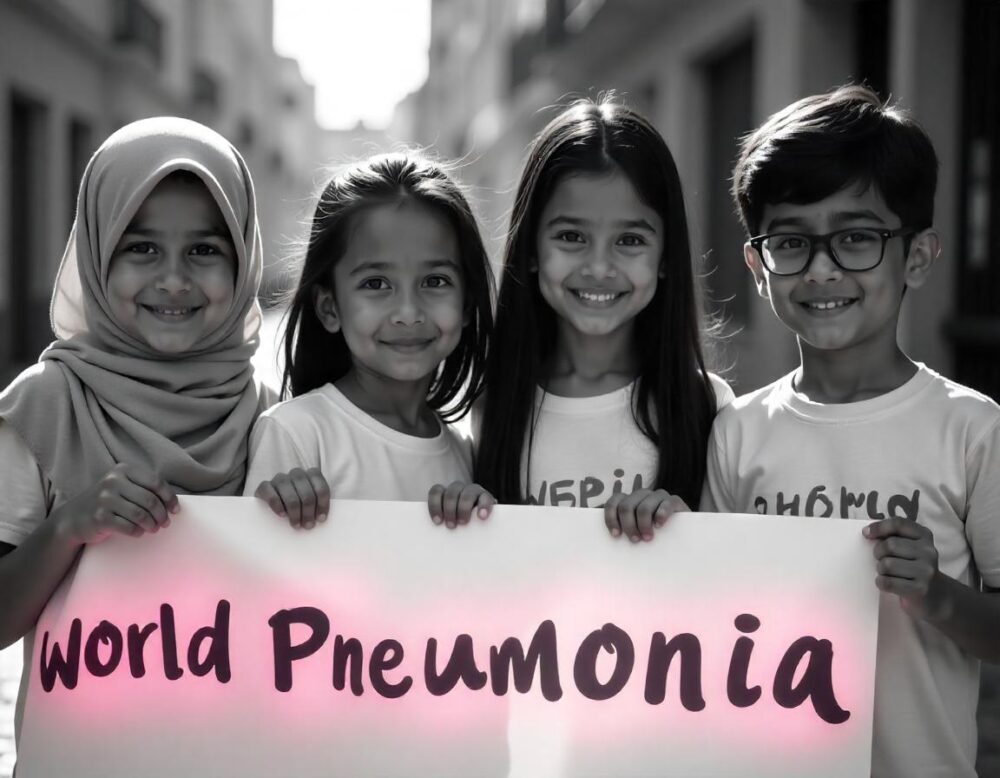

Home > News > Fighting Pneumonia: Ensuring Lifesaving Healthcare for Vulnerable Kids

Written by Leon B. Wellington, President | Published: November 12, 2024 at 1:40 pm
Imagine a young child struggling to breathe, gripped by a high fever, a cough that won’t let up, and chest pain. For parents, watching their child suffer through something like pneumonia is terrifying. Sadly, this is a daily reality for many families, especially in vulnerable communities where access to healthcare is limited.
According to the World Health Organization, pneumonia claims the lives of over 800,000 children under the age of five every year. This staggering number highlights an urgent need to improve healthcare access for children at risk, focusing on preventive measures, treatments, and community support to protect these vulnerable young lives.
Pneumonia remains a leading cause of child mortality worldwide, but it doesn’t have to be. By raising awareness and investing in solutions, we can change the narrative. This article dives deep into how pneumonia impacts children, what can be done to fight it, and why supporting initiatives like Give Miami Day can make a real difference.
Pneumonia is an infection that inflames the air sacs in one or both lungs, filling them with fluid or pus, which makes breathing painful and limits oxygen intake. For healthy kids, pneumonia is often treatable, especially with timely access to antibiotics and supportive care. However, for children in low-income families or underserved communities, lack of healthcare resources can turn a manageable illness into a deadly one.
So, why does pneumonia persist as a threat in this day and age? There are a few key factors:
Addressing these issues starts with preventive healthcare. By educating families about symptoms and risks, we can encourage early detection and prompt treatment, which can significantly reduce pneumonia-related deaths. Here’s a look at key prevention strategies:
| Strategy | Description | Target Audience | Expected Outcome | Cost Effectiveness |
| Vaccination | Regular immunizations for pneumonia and respiratory infections | Children under 5 | Reduced cases of vaccine-preventable pneumonia | High |
| Nutritional Support | Providing nutrient-rich meals to boost immunity | Malnourished children | Improved immune response to infections | Moderate |
| Parental Education | Training parents to recognize symptoms and seek early treatment | Parents in low-income areas | Early intervention, less severe illness progression | High |
| Clean Cooking Methods | Reducing exposure to indoor pollutants by using safe stoves | Families in rural areas | Lowered risk of respiratory issues | Moderate |
| Accessible Clinics | Setting up mobile health clinics in underserved areas | Remote communities | Improved access to timely care | High |
The table above outlines several strategies that healthcare providers and community organizations can adopt to combat pneumonia, focusing on prevention, education, and improved healthcare access.
When pneumonia strikes, timely treatment can save lives. Antibiotics are the primary treatment, but in underserved communities, they’re often unavailable or too expensive. For families in remote or impoverished areas, even basic medical supplies can be scarce. This gap in resources is a major hurdle in the fight against childhood pneumonia.
Consider this: when antibiotics are accessible, children diagnosed early have a high chance of recovery. But without these medications, pneumonia escalates, often leading to severe complications like respiratory failure. Strengthening supply chains and ensuring affordable medications can bridge the gap in healthcare, giving more children the chance to recover.
Furthermore, the misuse or overuse of antibiotics in some regions complicates the situation. In places with easy access, improper use can lead to antibiotic resistance, rendering standard treatments ineffective. Educating communities on proper medication use is another essential aspect of fighting pneumonia effectively.
For parents in high-risk communities, protecting their kids against pneumonia can feel challenging, but there are practical steps they can take. Here’s a quick checklist of actions that can make a significant difference:
These steps help minimize the risk of pneumonia and support quicker recovery in cases where infection does occur.
Give Miami Day plays a pivotal role in raising funds for healthcare programs that target underserved communities. This annual event encourages people from all backgrounds to come together and contribute to causes that make a real impact. Organizations like EFCC (efccinc.org) benefit from these donations, which allow them to expand their reach, provide critical resources, and educate families about disease prevention.
The beauty of Give Miami Day is that it isn’t just about one-time donations; it’s about creating a movement. Every dollar raised goes toward building stronger, healthier communities, and every donor becomes part of the solution. The funds raised through Give Miami Day help organizations provide the necessary supplies, fund healthcare initiatives, and empower local clinics to reach children who need medical assistance the most.
Pneumonia shouldn’t be a death sentence for any child. By investing in prevention, promoting accessible healthcare, and supporting organizations that fight for vulnerable kids, we can make a real difference. Initiatives like Give Miami Day allow each of us to contribute to lifesaving healthcare for those who need it most.
Every child deserves a healthy start, and every parent should have access to the care their kids need to thrive. Join the cause, support Give Miami Day, and help us ensure that no child has to suffer from preventable diseases like pneumonia.
If this article has been helpful to you, share your thoughts with us at info@efccinc.org.
To keep abreast of our latest news and events subscribe to our newsletter by clicking the SUBSCRIBE BUTTON.
Written by Leon B. Wellington, President
Written by Leon B. Wellington, President
Written by Leon B. Wellington, President
Written by Leon B. Wellington, President
Written by Leon B. Wellington, President